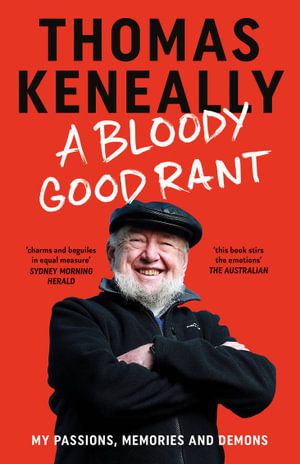Following a lifetime observing Australia and its people, Tom Keneally turns inwards to reflect on what has been important to him.
'When I was born in 1935 I grew up, despite the Depression and World War II, with a primitive sense of being fortunate . . . The utopian strain was very strong . . . if we weren't to be a better society, if we were simply serfs designed to support a system of privilege, what was the bloody point?'
Thomas Keneally has been observing, reflecting on and writing about Australia and the human condition for well over fifty years. In this deeply personal, passionately drawn and richly tuned collection he draws on a lifetime of engagement with the great issues of our recent history and his own moments of discovery and understanding.
He writes with unbounded joy of being a grandparent, and with intimacy and insight about the prospect of death and the meaning of faith. He is outraged about the treatment of Indigenous Australians and refugees, and argues fiercely against market economics and the cowardice of climate change deniers. And he introduces us to some of the people, both great and small, who have dappled his life.
Beautifully written, erudite and at times slyly funny, A Bloody Good Rant is an invitation to share the deep humanity of a truly great Australian.
Industry Reviews
'Keneally enchants with beautiful prose . . . Moving, funny, angry and explorative, this book is far more than a series of rants, in the sense of mindless shouting. Keneally's breadth of interests, and the energy with which he involves us in them, makes for a volume of great interest. The reader may wish to engage with it more than once.' —Canberra Times
'This book stirs the emotions . . . This book is, at times, deeply personal and will be controversial.' —The Australian
'A Bloody Good Rant charms and beguiles in equal measure. Ranting Keneally is a marvellous creation.' Sydney Morning Herald
'insightful and entertaining . . . Keenly perceptive, wise and witty' —The Chronicle
'The problem with Tom Keneally's latest book is where to stop. After several starts and stops, this reviewer is convinced that the best solution is to ration it out to yourself: at a few chapters a week, it will last two months. And you will need that time to absorb his philosophy. Not because it is dense or presented in convoluted prose, but because he raises so many interesting explanations of current or historical events.' —Tintean


























